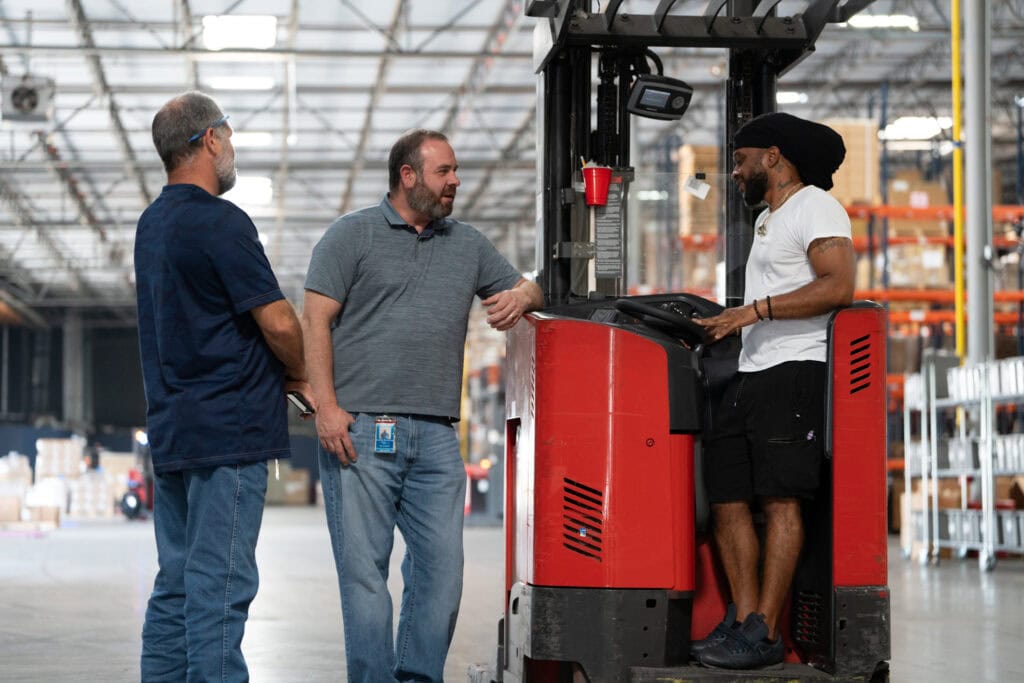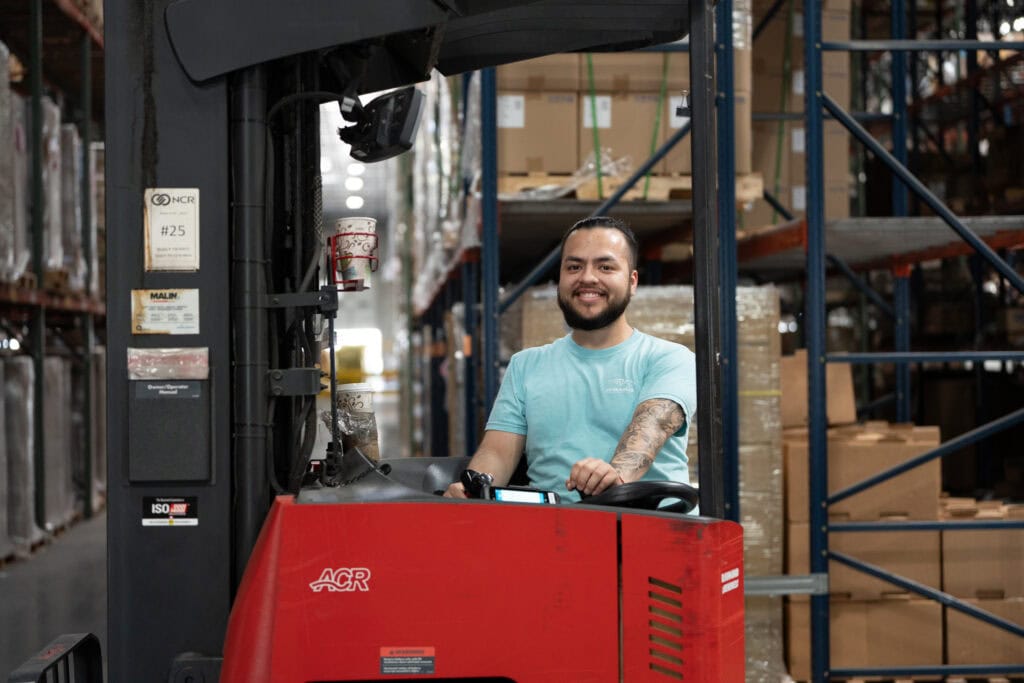In an ever-changing world, businesses need logistics partners who are more than just reliable; they need partners who are forward-thinking, adaptable, and equipped to navigate uncertainty. The past year has been a testament to the resilience of the logistics industry, with disruptions continuing to challenge even the most prepared companies.
As we move into 2025, the need for innovative solutions both in operations and sustainability has never been greater. This year-end recap highlights the lessons learned in 2024 and the steps we are taking to stay ahead in a rapidly evolving market. For businesses seeking a logistics partner who thrives under pressure and delivers value no matter the challenges, this is a glimpse into the future of resilience and innovation.
Key Takeaways
- Adapting to Uncertainty: It is critical to proactively invest in technology and sustainability to navigate the unpredictable landscape of 2025, ensuring resilience and operational efficiency.
- Innovative Solutions: Implementing advanced systems and practices to optimize the supply chain and deliver unmatched value to clients is necessary.
- Sustainability Focus: Environmental responsibility is crucial, with logistics providers integrating sustainability leaders and cutting-edge software to minimize their carbon footprint and serve both clients and the planet effectively.
- Strategic Partnerships: Collaboration with global partners and stakeholders enhances flexibility and adaptability, allowing businesses to respond swiftly to market changes and supply chain disruptions.
- Future-Ready Mindset: By embracing innovation and continuous improvement, the logistics sector is transforming challenges into opportunities, positioning itself as a trusted advisor and problem solver for complex freight forwarding needs.

The State of the Logistics Industry
As 2024 ends, the logistics industry reflects on a year marked by significant challenges. Persistent disruptions, many rooted in issues that have lingered since the onset of the COVID-19 pandemic, continued to shape the landscape. Recent developments, such as the longshoremen pulling out of contract negotiations on the East Coast, have added to the uncertainty. Now pushed to early 2025, these negotiations underscore the ongoing volatility within critical supply chain hubs.
Economic conditions also played a central role in the struggles faced by the transportation market this year. High interest rates dampened consumer spending, decreasing demand for goods movement across the country. As a result, 2024 saw a downturn across the U.S. logistics and transportation sectors, with many businesses grappling with a challenging economic climate.
“2024 for Pegasus Logistics and many people in the industry was a down year. Disruptions are still in the market, and the economic declines in transportation haven’t gone away.” – Hiram Hartnett, EVP of Sales at Pegasus Logistics
Despite these difficulties, there are signals of cautious optimism as the calendar turns to 2025. Recent indicators suggest domestic markets are picking up, offering a glimmer of hope for recovery. However, uncertainties remain. The longshoremen negotiations, interest rate trends, and broader geopolitical factors all have the potential to influence the industry’s trajectory in the coming months.
With these dynamics in mind, the logistics sector enters 2025 with tempered expectations and a readiness to adapt. While challenges persist, there’s a growing sense that the industry has learned from past disruptions, equipping it to navigate future uncertainties more effectively.
Challenges Facing the Logistics Industry
2024 has underscored the unpredictable nature of the logistics industry. While persistent economic and operational challenges may have shaped the year, the outlook for 2025 brings both opportunities and uncertainties. Core issues such as fluctuating consumer spending and geopolitical tensions have left their mark, creating a landscape where adaptability is no longer optional but essential.
The industry continues to grapple with the lingering effects of disruptions. Union negotiations at key U.S. ports highlight a broader struggle to modernize critical infrastructure, with automation and efficiency remaining elusive. The U.S., despite its global economic stature, ranks poorly in port efficiency compared to other nations, compounding the challenges for supply chain stakeholders.
“What worked yesterday isn’t going to work tomorrow. We continue to see disruption after disruption, from port negotiations to the economic uncertainties impacting consumer spending.” – Hiram Hartnett, EVP of Sales at Pegasus Logistics
Looking ahead, political outcomes, particularly those tied to the past election, could introduce further economic uncertainty. Questions surrounding tariff policies and trade agreements also loom large, potentially causing shifts in supply chain strategies. While markets have begun to show signs of stabilization, the specter of unforeseen disruptions still lingers.
As these challenges persist, the logistics industry must maintain a forward-thinking approach. The ability to innovate, adapt, and build resilience in uncertainty will define success in the months and years. Businesses that proactively address inefficiencies and embrace new ways of operating will be best positioned to navigate an increasingly complex global supply chain landscape.

A Forward-Thinking Approach to Logistics
As the logistics industry prepares for the challenges and opportunities of 2025, one thing is clear: the methods of the past will no longer suffice in a rapidly evolving market. Recent years’ disruptions and economic pressures have highlighted the need for businesses to rethink their strategies, invest in innovation, and prioritize adaptability.
For many in the industry, the mantra is simple: “What worked yesterday isn’t going to work tomorrow.” This shift in mindset is driving significant investments in technology and operational efficiency. From implementing advanced Transportation Management Systems (TMS) to adopting enterprise-wide automation, the focus is removing manual processes and empowering teams to manage higher-value tasks. These changes not only enhance efficiency but also improve the overall client experience, ensuring that businesses can meet the needs of their stakeholders even in turbulent times.
“We’re making significant investments, including a new domestic TMS and enterprise-wide bots, to enhance efficiency and ensure our people focus on managing what matters most—our clients and stakeholders.” – Hiram Hartnett, EVP of Sales at Pegasus Logistics
Sustainability has also taken center stage as logistics companies recognize the need for environmental stewardship. The integration of dedicated leadership roles and cutting-edge software solutions reflects a commitment to reducing the environmental impact of supply chain operations. By working collaboratively with clients and partners, businesses aim to create a more sustainable supply chain ecosystem that balances efficiency with responsibility.
As the industry embraces these changes, it’s clear that adaptability will be the key to navigating an uncertain future. Whether it’s through investing in people, leveraging innovative technology, or fostering collaboration, the logistics sector is poised to transform challenges into opportunities in the year ahead.
Collaboration and Innovation in Logistics
In an industry where change is constant, resilience has become the cornerstone of success. The logistics sector is responding to challenges by doubling down on collaboration, innovation, and a renewed commitment to flexibility. Businesses are rethinking how they engage with partners, optimize operations, and position themselves for long-term stability.
Key to this approach is the recognition that no single solution fits all. By combining controlled assets with strategic partnerships, companies are striking a balance between flexibility and reliability. For example, internal linehaul networks provide stability, while partnerships with domestic and international providers ensure adaptability in response to market shifts. This dual strategy enables businesses to weather both predictable and unexpected challenges.
“We’re striking a balance between stability and flexibility by combining controlled assets with strategic partnerships, both domestically and internationally, to maintain agility in an unpredictable market.” – Hiram Hartnett, EVP of Sales at Pegasus Logistics
Collaboration across the supply chain is also essential. Whether working with logistics providers, technology partners, or internal teams, the focus remains on creating seamless, efficient operations. Investments in systems like Warehouse Management Systems (WMS) and Transportation Management Systems (TMS), alongside sustainability tools, are paving the way for smarter, more responsive logistics networks.
This emphasis on resilience is not confined to technology alone. It’s also about fostering a culture of innovation and open-mindedness. Logistics teams are reevaluating traditional processes, asking critical questions about what’s working, and exploring opportunities for improvement. The industry is better equipped to deliver a stable, client-centered experience in an ever-changing environment by maintaining a forward-looking perspective.
As 2025 approaches, resilience in logistics is less about weathering the storm and more about thriving amidst it. Through strategic investments and collaborative efforts, the industry is charting a path toward a more agile and sustainable future.

Transformation Through Adaptability
As the logistics industry evolves, adaptability has emerged as the driving force behind meaningful transformation. The challenges of recent years have catalyzed a shift in how businesses operate, innovate, and engage with their partners. This forward-thinking mindset sets the stage for sustained growth and success in 2025 and beyond.
Investments in technology have been at the forefront of this transformation. From upgraded Warehouse and Transportation Management Systems to advanced sustainability tools, logistics providers are enhancing their operational capabilities to meet the needs of an increasingly complex supply chain. These innovations are not only streamlining processes but also positioning businesses to adapt to market disruptions with greater agility.
“Adaptability is going to be king. If people aren’t forward-thinking and open to innovation, they’ll struggle to meet the challenges of the future.” – Hiram Hartnett, EVP of Sales at Pegasus Logistics
At the same time, global partnerships are playing a critical role in maintaining flexibility. Whether working with ocean carriers or strategic partners overseas, businesses are creating networks that can respond to both domestic and international challenges. The goal is to ensure stability without sacrificing the ability to pivot in response to unexpected shifts.
Equally important is the cultural shift within the industry. Adaptability is no longer just a buzzword; it’s a core value that informs everything from operational strategies to client relationships. Teams are encouraged to think critically about their current practices and explore new ways to deliver value. By fostering collaboration and focusing on continuous improvement, the logistics sector is building a foundation for long-term resilience.
Heading into 2025, this transformation represents more than just technological or operational advancements. It reflects a commitment to reimagining what’s possible in logistics. By prioritizing innovation and adaptability, the industry is positioning itself to not only overcome challenges but to redefine success in a rapidly changing world.

Navigating Challenges with Resilience
The logistics industry is no stranger to obstacles, and 2024 brought its fair share. From labor strikes on the East Coast to geopolitical disruptions in regions like the Red Sea, the year highlighted the ongoing volatility that supply chains must navigate. As businesses look to 2025, many of these challenges remain unresolved, demanding both strategic foresight and operational agility.
One of the most pressing questions concerns the broader economic and political landscape. The outcomes of the U.S. elections could have far-reaching effects on the global economy, influencing everything from trade policies to consumer confidence. Similarly, potential changes to tariffs could trigger shifts in supply chain strategies, with companies revisiting decisions to source goods from Southeast Asia, Mexico, or other regions.
“It’s about asking, ‘What are you doing today, and what could you do tomorrow?’ Collaboration with partners, technology providers, and internal teams is key to driving the industry forward.” – Hiram Hartnett, EVP of Sales at Pegasus Logistics
Despite these uncertainties, the logistics sector has shown it can adapt to evolving circumstances. Lessons learned from prior disruptions have reinforced the importance of maintaining flexibility. For many companies, this has meant diversifying supply chains, investing in infrastructure, and strengthening partnerships to minimize vulnerabilities.
Sustainability has also emerged as a central focus, with logistics providers recognizing that environmental responsibility is no longer optional. Many are making bold moves to reduce their impact, such as hiring dedicated sustainability leaders and implementing technology to track and improve environmental performance. These efforts are not just about compliance; they reflect a broader commitment to serving both clients and the planet.
As the industry moves into 2025, the path forward is clear: embrace uncertainty as an opportunity to innovate and adapt. By addressing obstacles head-on and remaining open to change, logistics providers are proving that resilience isn’t just about surviving disruptions—it’s about thriving in spite of them.
A Hopeful Horizon: Preparing for 2025 and Beyond
As the logistics industry reflects on the challenges of 2024, a sense of cautious optimism emerges for the year ahead. This past year was defined by disruptions, from labor strikes to geopolitical instability, but it also served as a proving ground for resilience and adaptability. Now, as businesses focus on 2025, they are better equipped to navigate uncertainty and seize new opportunities.
The lessons of 2024 emphasize the importance of strategic investments and forward-thinking approaches. Companies are doubling down on initiatives that enhance flexibility and sustainability, recognizing that these elements are critical to long-term success. From building infrastructure in Mexico to embracing sustainability as a core value, the logistics sector is demonstrating its commitment to evolving with the times.
“We’re serious about sustainability and collaboration, not just for the sake of compliance but to be better stewards of the environment and better partners to our clients.” – Hiram Hartnett, EVP of Sales at Pegasus Logistics
Uncertainty remains a key theme as 2025 approaches. Questions about the economic impact of U.S. elections and potential changes to trade policies loom large. Yet, these uncertainties also present opportunities for companies to reassess their strategies and strengthen their supply chain networks. By remaining adaptable and open to change, the industry is positioning itself to thrive regardless of what lies ahead.
At the heart of this optimism is a renewed focus on partnerships and collaboration. By working closely with clients, network partners, and technology providers, logistics companies are creating more agile and efficient operations. This approach not only helps businesses weather short-term disruptions but also lays the groundwork for sustained growth in a dynamic global marketplace.
As 2025 unfolds, the logistics industry is poised to turn challenges into opportunities. By prioritizing innovation, sustainability, and adaptability, businesses are charting a hopeful horizon—one where resilience and transformation drive continued success.

Speak to Our Logistics Team
If you’re looking for a reliable and flexible warehouse management outsourcing solution, our team at Pegasus Logistics Group can help you. We’re committed to delivering the best possible client experience and growing with you as your business grows.
About Pegasus Logistics Group
We provide custom logistics solutions and outstanding experiences by investing resources into team members, technology, and a superior transportation network. Taking the necessary steps to find the perfect match for your warehouse operations will ensure that they will perform optimally while also providing protection and helping your business reach its goals.
We have strategically positioned capacity available for your ever-changing supply chain. Our operational model has strict performance benchmarks, and we are focused on delivering your company the best value, efficient results, and the most reliable service.

